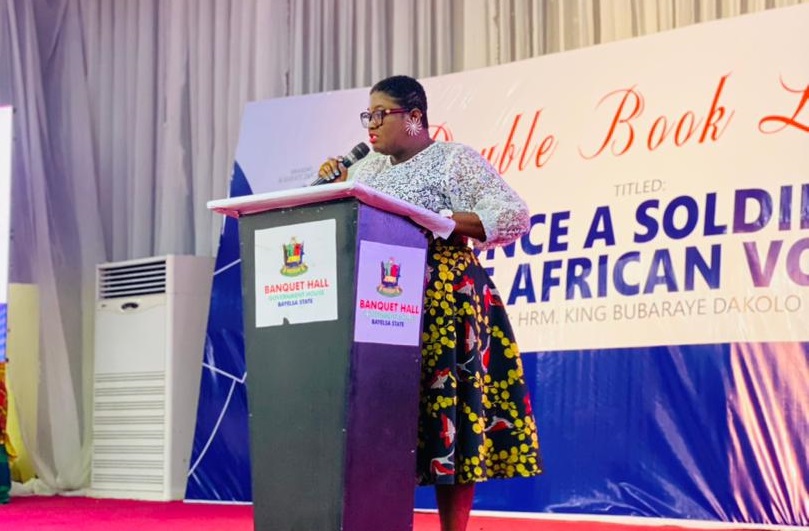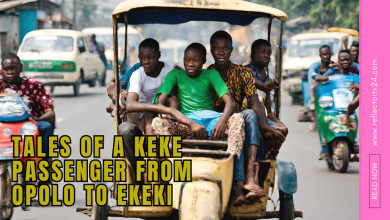A Merging Void From Yesterday’s History: A Review of His Royal Majesty King Bubaraye Dakolo’s The African Voice

A Merging Void From Yesterday’s History: A Review of His Royal Majesty King Bubaraye Dakolo’s The African Voice
Fast-rising Niger Delta writer, educationist and teen coach, Ebidenyefa Tarila-Nikade takes us through one of the new books of His Royal Majesty, King Bubaraye Dakolo titled The African Voice, she titles her review A Merging Void From Yesterday’s History.
The past lays the foundation for the future, and without history, there can be no future because history is a shared legacy we all carry within. In 222 pages, HRM tells a history, recounts a journey as an observant traveller, and expands his ideals on Pan-Africanism with particular attention to the reckless exploration activities of the IOCs domiciled in the Niger Delta and neighbouring African countries, which has been his primary interest and driven his creativity into birthing two captivating titles on the subject-matter. The quest to ensure the continued existence of mother earth is, so far, the consolidated matriarch of all existentialities.
The African Voice steers intriguing questioning reminiscent of a time that was, querying the current times and expresses the hopefulness for a time that should be if African leaders, in the words of the author, “heed the strident call for unity, after sixty-odd years since the colonial lords bequeathed ceremonial independence to Africa and in synchronisation with the diligent efforts of visionary African leaders like Kwame Nkrumah. It captures the essence of our collective journey as Africans, portraying the convergence of our experiences, our struggles, our common adversaries (imperialism, white supremacy and neo-colonialism), our dreams, and aspirations for the Africa we desire to see, told by one man, King Bubaraye Dakolo, on a journey traversing two neighbouring countries and armed with a mental notebook – a cognitive log, which merges yesterday’s history with today’s verity.
Particularly worthy of commendation and notable among other phenomena highlighted in the book is the potency of a voiceless voice note sent to the author from the diaspora marking the genesis of all the ruminations, the recall, the humour, the serenades, the picturesque reverberations, the melodies, rhythms, and lyrics of Nina Simone’s song, unmistakable voices of Aziba, Izonkeme, President Fidel Castro of Cuba Marcus Garvey, Malcolm X, Mohammed Ali, Julius Nyerere, to mention a few. The voices were African and non-African, all in a blend of historical warfare and conquests seeking the emancipation of Africa from the beleaguered troubles of ancient ruins, from the old world to the new world. How form was made out of formlessness, and a sense of senselessness resonates with the uniqueness of every writer’s creativity because a book is an intellectual creation emerging from the void and enlivened by the writer’s astute ingenuity. But this particular masterstroke of a compendium of voices in voicelessness exhibits a remarkable level of creativity to the extent that it makes the book not only difficult to classify according to Martin Egblewogbe but makes it stand out as one-of-a-kind and on its own, epitomising the pinnacle of literary finesse in line with the venerable status of the written word in pliant writing.

32 Chapters of lucid narration. Enthralling scenarios. Each chapter explores the major themes of ecocritical realities – environmental degradation and poverty amid plenty, how Europe views Africa as the land of raw materials, and so to keep exploring, Africa must keep warring and abiding in eternal disunity despite all the efforts of notable African leaders to right this anomaly. The author’s angst against a cheating system is felt on almost every page. The succinct elucidation broadens the reader’s scope of the Game Plan, and the epiphanic interaction is nothing short of revolutionary.
The virtues of communal living among African families and reciprocation of kind deeds typical of the “one good turn deserves another’ adage is extolled in the story of Timi Dakolo’s rise to fame during the inaugural season of Idols West Africa in 2007. It is interesting to identify His Royal Majesty, King Bubaraye Dakolo, the Agada of Ekpetiama Kingdom, as the much-talked-about benefactor uncle of Timi Dakolo. This is where I am tempted to say, ” Your Majesty, Sir, thank you for holding the metaphoric “etele” with such zeal and resilience.`
One book – The Riddle of the Oil Thief; One event – Pa Gya Literary Festival; One Invitation and a visit; one topical issue evoking intricately woven nostalgia; A time travel, blending the triumphant past, today’s substantive incongruence, and the terrifying yet hopeful future, and another book is birthed – The African Voice.
Picking defects in a book as revelatory and touching as this is somewhat daunting. However, expressions such as barest minimum, bogus, and potentials could be reviewed to ensure the contextual appropriateness within which they are enunciated.
Again, I say, The African Voice is in a class of its own. A real-time-traveling history book about the Niger Delta, Nigeria, and Africa, told by an eyewitness, HRM, King Bubaraye Dakolo.
read more:

